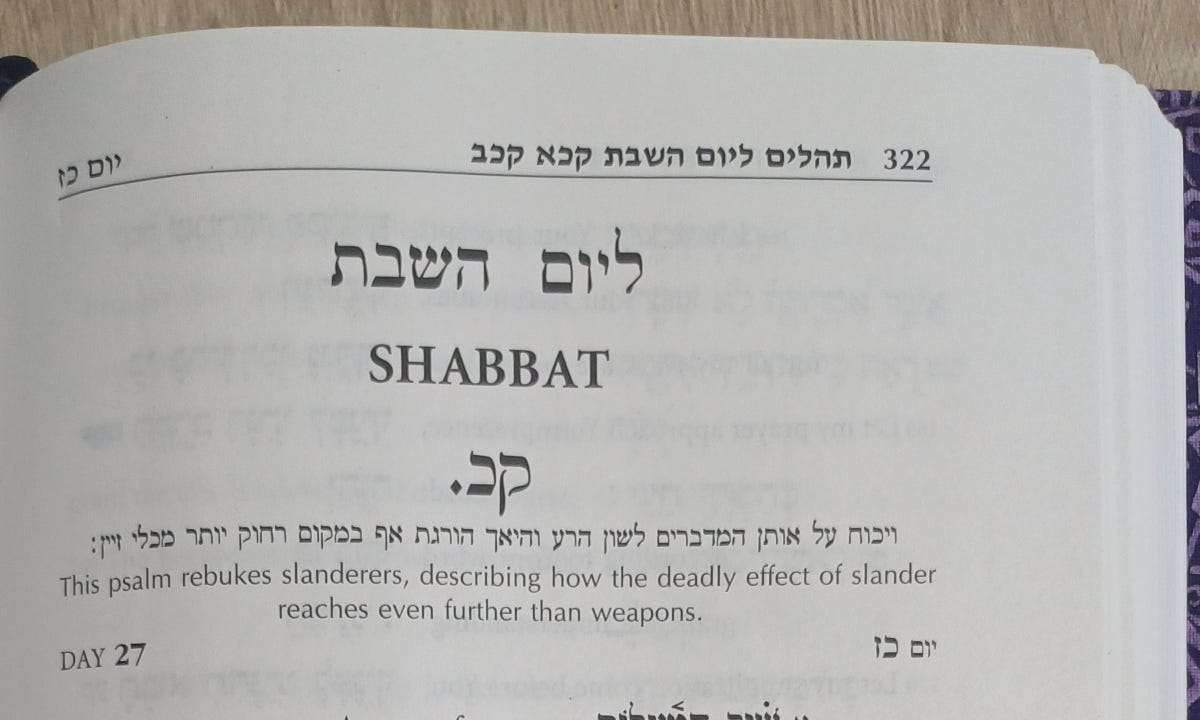Praying for Survivors and Others
Countless Israelis still suffer from trauma associated with October 7. How you can help.
We have prayed for the soldiers and hostages and thanked G-d for the return of our people from the tunnels of Gaza. But our work is not done. We need now to turn our attention to the thousands of people suffering from the trauma of October 7, 2023.
The Problem
It seems like every week that Israelis hear of another suicide related to October 7. In October it was a young man who survived the massacre at the Nova music festival after seeing untold horrors and losing friends and quite possibly loved ones. Last week it was a close friend of my friend’s daughter. The woman, around 30 years old, had known my friend’s daughter since they were 18; they did their national service together and stayed close. A children’s social worker living in the south of Israel, she had been treating internal refugees (those whose homes were under nearly constant missile and mortar attack who fled to safer places in Israel), survivors of October 7, and those orphaned by the war. For the last six months she had been sinking farther and farther into despair, and this past week she ended her life.
The hostages will need mental health assistance to recover from their trauma; we’re all aware of that. But it has been too easy to forget others. One important group is the men and women who went into the destroyed communities looking for bodies so that the dead could be identified. Many of them were volunteers from the ZAKA organizationi ; rabbis serving in the Israeli army and many others were sent or volunteered. Those who were tasked with identifying the dead and those preparing them for burial were also traumatized.ii I will not publish here any of the places that they found remains; many are unspeakable.iii
Others on whose hearts the atrocities are imprinted are journalists and photographers who went into the affected area to document what occurred. The families of the hostages, both alive and dead; parents, spouses, children, and friends of the 1200 murdered on October 7 and of the more than 1,000 Israeli soldiers who have died, and the thousands of injured and their families have also suffered. Many of the injured are dealing with life-changing injuries including paralyzation, amputations, and brain injuries; blindness and deafness; and disfigurement and organ damage affecting their future lives.
Besides victims themselves, therapists are spending hour after hour listening to adults and children recount the unbelievable evil of which they were victims or observers. The therapists, who are not immune to the stories they hear, are tasked with helping the victims find their ways back to some semblance of normality. But there are not enough therapists for the victims, much less the therapists who cannot get the inhumanity and suffering out of their minds.
What We Can Do
We have heard from many former hostages that they could feel the power of the many prayers and psalms said for them. Even in the black tunnels the awareness of these prayers gave them the strength to hold on. The prayers came not only from Israel, not only from Jews, but from caring people of all nationalities and religions around the world.
Now we need to mobilize prayers on an ongoing basis for all of the forgotten sufferers.
Jewish Prayers
When we Jews pray for another living person, we use their name and the name of their mother. The names are joined by ben (son) or bat (daughter). When the sufferer or mother does not have a Hebrew name, their common name is used. Examples of each: I prayed daily for Ziv ben Sylvia Monicaiv as well as for Segev ben Galit.
Using the names of the people is the strongest way to pray for them. However, we cannot know all the names of those suffering. We must still pray for their complete healing. “Complete” means, as our prayer says, healing the spirit and healing the body.
Much of Jewish prayer is formal. Our traditional prayer book goes back, in various forms, over 1,000 years. According to Jewish law, women, who traditionally had extensive familial and social responsibilities that cannot easily be compartmentalized by time, are exempt from time-bound commandments. This includes praying the three daily prayer services. At the same time, many women need little or no encouragement to speak to God informally, although often women who become religious after being raised in secular or nontraditional homes may not be aware of this. Today, with fewer women in the home full-time and many with schedules similar to men’s, formal daily prayer is encouraged.
The Jewish weekday prayers include a prayer for a complete healing of all of our sick and injured. After reciting this blessing, one can add the names of people suffering from physical, mental, or emotional ills. This is also the time to request restoring the broken bodies and spirits of members of the groups mentioned above.
According to Jewish law, personal petitions (specific requests) are not made on the Sabbath except in emergencies.
Jews do not have a tradition of speaking personal prayers aloud to others, unlike many Christians who often use their own words to bless people, meals, or events. Personal prayers in Judaism are generally silent.
Psalms
If you are not familiar with the Book of Psalms, this is your opportunity. These are poems on different themes. Many of the psalms are attributed to King David; others were written by others. Some are songs of praise, others are petitions and cries for help from God, and others have a theme of thanks and gratitude. Several are historical, listing important moments in Jewish history. Some go from pain to joy in one poem. They go from four or five lines to 176 lines (Psalm 119). In Hebrew, several are acrostics: the lines are arranged alphabetically according to the first word.
Reciting psalms is a form of prayer. For women, who are not obligated to the three formal prayer services, psalms have traditionally been an important way to communicate with God. There are also many stories about men who filled the boring hours of tedious work by reciting psalms that they had memorized.

If your church does not have any customs regarding reading psalms, feel free to borrow one of the Jewish customs below, use the psalms in the graphic, or create your own. The important thing, from the position of this essay, is to say, before you begin, that you are asking for a complete healing of body and soul for those still hurting from the events of October 7 and its aftermath.
Here are the major Jewish customs regarding reciting psalms.
Many Jews recite a preparatory prayer before reciting psalms, and some say both a preparatory and final blessing, but many do not.
According to some, psalms should only be recited in Hebrew. But Judaism teaches that God hears everyone’s prayers, Jewish or not, and in any language. After all, He himself destroyed the Tower of Babel and separated people into different language groups.v
One way of dividing the 150 individual psalms is into days of the week. For example, Psalms 120-150 are classified as for the Sabbath day.
A second way of dividing the psalms is into 30 groups of roughly equal length for the days of the month. No Hebrew month has fewer than 29 days and none more than 30. On months of 29 days, the psalms for days 29 and 30 are recited together.vi
Some say the psalm one number after their age. For example, a 35 year old would say Psalm 36 every day until his or her next birthday.vii Using this formula, many mothers say the psalms for each of their children, their husbands, and themselves. For many months I was part of a group who said psalms daily for all the hostages. I was assigned the names of the two hostages who were 25 years old and the one who was 26, so I recited Psalms 26 and 27 daily. Since I knew the names of these three young men, I mentioned each of them before reading their psalm.
I have written a prayer that can be said before reciting one or more psalms or a personal prayer in your own words. Here are two printable versions, one for people outside of Israel and one for those inside the country.
The minor differences are that the version for “outside” mentions Israel as a distant place, whereas that for “inside” uses more immediate language.
While there are still soldiers protecting our land in Gaza, Lebanon and Syria, the worst of the war is over for most of us. But for the thousands traumatized, physically injured, and bereaved, the war continues. These people—men, women and children, Jews, Muslims, Christians, citizens of Israel and foreign workers—need our prayers as badly as did the hostages.
I encourage all my readers to share this post as widely as possible to friends, members of prayer circles to which you belong, teachers and administrators of religious schools, and anyone else you know who might care. Your prayers are all welcome.
i The ZAKA group, a largely volunteer organization, collects remnants of bodies after terror attacks because according to Jewish law all the parts of a body are holy and are to be buried in consecrated ground. Read about them here: https://www.chabad.org/library/article_cdo/aid/779329/jewish/ZAKA-Volunteers-A-Mission-of-Selfless-Kindness.htm
ii An article written in late October 2023: https://www.chabad.org/news/article_cdo/aid/6150640/jewish/The-Painful-Painstaking-Work-of-Israels-Burial-Societies.htm
iii If you are not aware of the events that precipitated the Israel-Hamas war,, I suggest that you search in YouTube for live videos of the October 7, 2023 attacks. These are go-pro videos taken by the terrorists. Be sure no children are in the room if you watch. If you are more sensitive, look for reportage rather than the live videos.
iv If praying for the soul of someone who has passed we use the father’s name, as Chaim ben Yoel or Yehudit bat David. I also prayed daily for Ziv’s twin brother, Gali ben Sylvia Monica.
v https://www.chabad.org/library/article_cdo/aid/1013006/jewish/The-Tower-of-Babel-What-Was-Up-With-lt.htm
vi The majority of Jews reciting psalms on a regular basis are observant Jews for whom the Hebrew months are still relevant, although we use the secular calendar for secular things like work.
vii I looked into and began the practice of saying psalms when I was 44 years old because a rabbi I had consulted on a personal matter told me to say either all of Psalm 45 or at least one “letter” from Psalm 119, which has eight verses for each letter of the Hebrew alphabet, daily except on the Sabbath, when I should recite the 15 Songs of Ascent—Psalms 120-134.




I love your clear writing style that helps me understand and connect to your message. This is a very important topic you wrote about that people need to be reminded about.